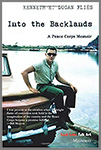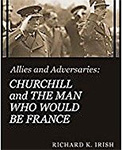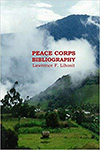New books by Peace Corps writers — July 2018
To purchase any of these books from Amazon.com — Click on the book cover, the bold book title, or the publishing format you would like — and Peace Corps Worldwide, an Amazon Associate, will receive a small remittance from your purchase that will help support the site and the annual Peace Corps Writers awards.
We are now including a one-sentence description — provided by the author — for the books listed here in hopes of encouraging readers 1) to order the book and 2) to volunteer to review it. See a book you’d like to review for Peace Corps Worldwide? Send a note to Marian at peacecorpsworldwide@gmail.com, and we’ll send you a copy along with a few instructions.
•
 The Last Thing I Told You
The Last Thing I Told You
by Emily Arsenault (South Africa 2004-06)
William Morrow Publisher
416 pages
July 2018
$14.75 (paperback); $10.9 (Kindle); $14.95 (Audible)
This psychological thriller about the murder of a psychologist in a quiet New England town and his former patient whose unreliable thread will keep readers guessing until the shocking end.
•
 Voices: A Retrospective on the Vietnam War and the Peace Corps
Voices: A Retrospective on the Vietnam War and the Peace Corps
by Jack Boyd (Kenya
CreateSpace
186 pages
August 2017
$24.00 (paperback); $7.00 (Kindle)
This memoir is one PCVs account of living and teaching in Kenya, East Africa for two years — those years are tearfully remembered for the assassinations of MLK and Robert Kennedy, war in the Middle East, and urban riots in places like Detroit where he was born.
•
 Into the Backlands: A Peace Corps Memoir
Into the Backlands: A Peace Corps Memoir
by Kenneth E. Dugan Fliés (Brazil 1961–63)
Lost Lake Folk Art Books
236 pages
June 19, 2018
$17.95 (paperback)
What began as an adventure of a lifetime for 19-year-old Ken Fliés when he joined Peace Corps and went to the Backlands of Brazil in 1961, turned into a lifetime of adventure.
•
Use Your Voice! Political Poetry and More
by Dorothy Herzberg (Nigeria 1961-63)
CreateSpace
74 pages
May 2018
$10.00 (paperback); $2.99 (Kindle)
Poems by Dorothy Herzberg in response to the 2016 presidential election and the current term in 2018.
•
 Allies and Adversaries: Churchill and the Man Who Would Be France
Allies and Adversaries: Churchill and the Man Who Would Be France
by Richard K. Irish (Philippines 1962-64)
Amazon Kindle
640 pages
June 2018
$9.99 (Kindle)
A book about the theatrical collisions between two gargantuan egos: the inexorable force Churchill versus the immoveable body de Gaulle.
•
 Nature’s Poetry
Nature’s Poetry
by Eldon Katter (Ethiopia 1962-64)
CreateSpace
112 pages
July 2018
$5.99 (paperback)
Nature’s Poetry is an engaging, informal compilation of the author’s poetry and art. Black and white illustrations appear on almost every page.
•
 Peace Corps Bibliography
Peace Corps Bibliography
by Lawrence F. Lihosit (Honduras 1975–77)
Self-Published
66 pages
July 2018
Current — as of early 2018 — books written by former Peace Corps Volunteers about their tours overseas. This is a map to first person accounts of adventure and misadventure; also included is a listing of Peace Corps history books with different opinions about the agency’s meaning and worth.
•

Kevin M. Denny
Erriff
Leenane
County Galway
Ireland
Dear Marian,
The years have passed and we are now the ones charged with remembering the “good old days’ for those who might be following in our tracks. The good news is that as long as we can put one foot in front of the other, we can still lay down new tracks.
With retirement to the beauty of western Ireland has come the burst of optimism needed for me to re-open my drawer of writings ignored for too long. I have run out of excuses.
It has now been over fifty-five years that I have been incubating Peter’s Perils, a novel set in the time and place of my Peace Corps Experience, Malawi, 1964-1966. I cannot recall, and would not expect you to be able to do so either, whether I have ever shared this with you before.
As ink, paper and “Xeroxing” (Do they still call it that?) are no longer a factor, I would like to send you a finished “in toto” copy of Peter’s Perils. That way, if you are so inclined, you can read as much or as little as you wish. If you would like to see it, I would be glad to it to you, if you give me an E-mail address
Below is the package of goodies I am sending out to literary agents … hope does indeed spring eternally! Some introductory paragraphs appear needed, as my initial impetus for writing this novel was to capture the remarkable life of Peter Kilakwa. I met him is 1966 when I was 22 and he was probably about ninety-three. His conversation with me began, “My father was the first one to see Livingstone and he almost killed him.”
My desire as a writer was always been to introduce to the reader a simple man whose life was one exemplified by perseverance, faith and fate, both malignant and blessed. I have always believed that any measure of success would be a reader who, upon concluding Peter’s story, would say, “Oh, how I would have loved to have known him.”
John has looked at the MS and has encouraged me to send it a select number of literary agent he thinks might have an interest.
Thanks for your help. Please do not require yourself to read beyond your pleasure point.
Kevin Denny
**********
TEMPLATE
Letter to Literary Agent
Kevin M. Denny, MD, MPH, MA
The Field
Leenane
Galway
Ireland
February 11th, 2019
Dear Sir, Madam or Machine,
I am writing you with the advice and encouragement of John Coyne. John and I are from the same generation of the Peace Corps. John was in Ethiopia and I was in Malawi in the early sixties when independence was coming to Africa.
How I came to meet Peter Kilakwa is essential to an appreciation of Peter’s Perils.
With your forbearance, please allow me to begin by describing how I met Peter, the slave boy who became a Canon in the Anglican Church.
The Story Begins
It was my last day. In the morning I had said good-bye to the village I had known for two years and then I wandered the town, trying to use my eyes as a camera to capture everything I would never see again. My last stop was at the post office where I encountered Father Tovey, an Anglican missionary, who asked me when I was leaving. I told him the Peace Corps lorry would be at my door early in the morning to start me on my homeward journey. Then he asked what seemed a rather strange question: Had I ever met Peter Kilakwa? I admitted that I had never even heard his name. He then insisted I must meet him before leaving.
He had told me where to find him and after lunch I jumped on my Ducati. When I reached his village, a small man with glasses as thick as English muffins, wearing a well-worn cassock with a faded purple cincture, greeted me, “I presume you have come to hear my story.”
He guided me to a two wicker chairs under a mango tree and began his story. “I grew up in this very village. I was about six and I will never forget that day. I was playing near the lake when I heard loud shouting coming the village and then I saw grass roofs burning. Then I heard my mother’s voice crying out, ‘Run Tembo, run’ but I could not leave her. I hid behind a rock and what I saw was beyond human belief. My grandmother was lying on ground, her life bleeding away. Small children were hanging headless from trees. To the slavers it was only the men who would have value at the slave market of Zanzibar. I ran toward my mother but one of the slavers grabbed me and said, ‘You are a brave little one, but you cannot save your mother now.’
He then described the unfathomable brutality of the slavers as they used their whips on those that who could not keep up with the caravan as it marched to the sea. He stopped, his eyes watery, he said, “I could not believe how one human could treat another.”
After a minute he was able to continue, “At the slave market at Zanzibar, an old Arab, with the look of Satan himself, threw down a few coins in disgust, saying I wasn’t worth a penny because it was unlikely I would live to see Oman. My only good fortune was that when they dragged me to a dhow I spotted his father. But my relief was brief because I saw slavers pushing him down into the cargo hold, from which he would emerge only briefly twice a day.”
“Then, after three days at sea, I could see a dark cloud rising from the ocean. One of the younger slavers yelled, ‘They are coming. They are coming. The men who eat little children are coming.’
“I could see the slavers were frantic. They began dragging their human cargo up to the deck. Some they just threw into the ocean. My father tried to grab my hand. A wicked looking slaver pulled him away from me. Not finished with his work, he picked up his scimitar and severed my father’s head before pushing his body into the sea. With a lightened load, the dhow made a desperate attempt to outrun the approaching ship. Then the cannons began to boom and I knew my life was over.
“The first shot fell short, but, as the ship headed full steam toward us, its accuracy improved. It was only a matter of minutes before they had a direct hit that tore our mast into splinters. Then the dhow began to tilt and swiftly dropped to the bottom of the sea.
“I had never learned to swim, but when I surfaced I spotted a section of the mast and learned quickly. Somehow I reached the mast and held on like my life depended on it … which, of course, it did.
“The next thing I can remember was seeing men in rowboat heading toward me. It was terrifying because I had never see anyone like them before. They were all dressed in blue and had beards that reached to their bellies. Their skin was pale and sickly. I knew they were the men who ate children.
“The rowboat came toward me. One of men reached out and grabbed ahold of my arm. As he pulled me into the boat, I heard him say, ‘Okay, Okay’, as he wrapped a blanket around me. I could not understand anything else he said, but the men in the boat seemed kind. After there were no more bodies to be seen on the surface of the water, they rowed back to their ship. There were seven other survivors in the rowboat with me. One was an Arab and I could not understand why they would save someone so evil.
“When we reached the frigate one of the men carried me up the ladder and, when we reached the deck, another man gave me hot tea and a warm blanket, which I gathered was to keep me alive until they were ready to have me for dinner. But they treated all of us with kindness, bringing us dry clothes and stew. Soon the sailors were treating me like their little pet and they made me the punkha boy for their mess.
“After we had been sailing two more days, I could sense a change. The men began talking among themselves but they had lost their laughter. I could hear the men in a disagreement with the captain. Then, later in the day when we could see sea gulls and knew that land was near, one of the sailors took my hand and led me up the stairs and into the captain’s quarters. The captain did not seem happy. He just walked over to his sea chest and lifted its top. One of the sailors lifted me into the chest, squeezing his finger to his lips … a message for me not to say a word.
“We landed only long enough to deliver our cargo to the shore, still miles from their homes. After we had sailed out to sea for a few hours, the captain lifted the top of sea chest and said, ‘Now, little man, you are one of us.’ “
The sun had begun its descent behind the mountains. Peter’s eyes began to flutter and he confessed, “I am an old man. I am sorry, but I am growing tired. Would it be possible for you to come back in the morning to hear the rest of my story?”
The lorry arrived as promised early the next morning and I began my homeward journey, leaving behind a story half-told and a hunger to know the rest of Peter’s story. When I returned two years later with hopes of completing his story, the villagers remembered me and told me that sadly, “Peter is no more.”
Peter was in his nineties when I met him. It is possible that I could have been the last person with whom he shared his story. I retuned home and completed the first chapter of Peter’s Perils, but the start of the next chapter brought my own reality. How could I tell the story of a man when I knew so little about his life? In the end, it is my hope that Peter would have been pleased, not just by how I told his story, but more importantly, by how I conveyed that his sorrows were never stronger than his faith.
So what is the genre’ of my story? Up to the point where Peter could no longer continue his story, it was that of an anthropologist sitting across from a very old man, capturing his story so that it would not be lost to history … nonfiction by definition. But once he was not there to tell the rest of his story, fiction had to take over.
I will not deny that without the words I heard from Peter himself, there could have been no story. Without our meeting beneath the mango tree, it would have been impossible to paint his life on whole cloth. At the same time, to complete his story the burden of truth needed to be suspended. In the end, it matters little to this writer how its genre be determined. What matters is whether it has been a story well told.
KMD February 9th 2019
About the Author
Kevin M. Denny, MD. MPH, MA
The author is a child psychiatrist who has recently retired to a cottage in the west of Ireland. He is the author of profession publications, as well as a self help book for adolescents, How to Manipulate Your Way to Happiness: Thirty-seven Easy Steps in the Care and Feeding of Your Parents. With his wife, Susan, a clinical social worker, he has recently published a primer for parents learning that their child has autism, Understand Me, Please.
Dr. Denny was one of President Kennedy’s first Peace Corp Volunteers, serving in Malawi from 1964 to 1966. In addition to training in Child and Adolescent Psychiatry, he has master’s degrees in Anthropology and in Public Health. In 1991 he founded the Malawi Children’s Village, a community based program for children who had lost parents to AIDS. This program, now in its 28th year, provides life saving and life enhancing services to over 2,000 orphan annually. In 2003 Dr. Denny was the recipient the prestigious Sargent Shriver Humanitarian Award presented by the National Peace Corps Association for founding MCV.
Thank you. Look forward to hearing from you.
KMD